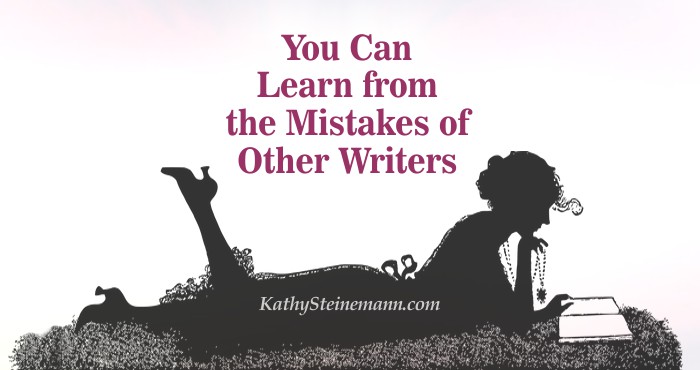
Bad Writing Can Help Me?
Authors are urged to read in order to become better writers. But can they learn by reading bad writing? Guest blogger Rhonda Kronyk says yes.
—

You’ve likely heard that writers need to read good writing to get better at their art. Reading exposes you to ideas, techniques, styles, and methods that you may not otherwise learn about. The more good writing you read, the better your writing will get. It’s a simple process of osmosis.
But what about bad writing? There’s plenty of it out there, and it’s not hard to find. You’ll likely be tempted to toss it once you realize it has little merit.
But wait a minute. Let me give you some reasons to spend time reading bad novels.
Reason #1. Bad writing tends to exaggerate the conventions of the genre.
I know you’ve seen this. Romance, sci-fi, mystery, or thriller: they all follow some basic “rules” about character, plot, etc. Even if you write alternative fiction in any of these genres, you have to follow some of the conventions so that your readers understand what you are writing. Can you imagine a romance without a love interest? Or a thriller without any suspense?
But what happens when inexperienced writers get their hands on these conventions? Often they overuse them or exaggerate them. Characters turn into caricatures, settings are melodramatic, and the plot has more rises and falls than a roller coaster.
How does this help you? Seeing an exaggerated version of genre conventions makes them much easier to learn. You quickly begin to recognize the formats used to write different styles. The more skilled you become at understanding the conventions and the way they are used, the better you become at using them yourself.
The Writer’s Lexicon series
and additional resources on my Facebook page.
Reason #2. Bad writing reminds you to step into your reader’s shoes.
You’re a writer. But sometimes you need to step back from your writing, and approach your work from a new perspective.
Spend some time reading bad prose. Examine it from a reader’s viewpoint. What’s annoying you? Why is it a problem? Are the characters flat and boring? Does the plot stall? Does the climax fail miserably?
If you don’t know what constitutes a weak plot, how will you create a strong one? The same is true for every other element that goes into a novel. When you examine the elements of a bad story from a reader’s perspective, you open your mind, and it becomes easier to spot similar weaknesses in your own writing.
Reason #3. Bad writing helps you to recognize your skill.
Writing is an individual sport, not a team sport. When you spend a lot of time in your own head, with your own work, it becomes easy to lose perspective.
It’s also common for writers to be unable to recognize the quality of their work. This is perfectly natural, especially if you spend all of your time reading the best literature available. Most of us will never reach the level of Faulkner or Gaiman. Yet, we often compare ourselves to successful writers, which can leave a bad taste in our mouth.
When you think about it, it seems kind of silly to set the bar so high, doesn’t it? Rather than waste time worrying about how famous other writers are, learn to understand your skill level. If you’re able to recognize poor writing, chances are your writing is better than that. Spend some time comparing yourself to hack writers because that will make it easier to see your own strengths.
Whether we like to admit it or not, we get a secret thrill when we know that our work is better than someone else’s. Don’t be embarrassed. Embrace it. Use it to your advantage, and let that knowledge motivate you to become an even better writer.
Don’t automatically toss a book because you recognize its weaknesses. Study it and use it to strengthen your own work. You might be surprised at how much you can learn by spending a couple of hours with a writer whose work you wouldn’t normally read.
—
About the Author
Rhonda Kronyk is a freelance editor and writer who spends more time with her nose buried in a book than not.
The Writer’s Lexicon series
and additional resources on my Facebook page.
Discover more from KathySteinemann.com: Free Resources for Writers
Subscribe to get the latest posts sent to your email.

Love these tips, Rhonda! This is a great perspective to take on reading bad prose — especially love the point about the conventions of genre. Never thought of it that way.
Glad you liked it Dana. I first figured a lot of this out when I began to write academic papers. I loved examples of poor papers because I learned what not to do.
Thanks for stopping by
Thanks for your words of wisdom, Rhonda. They hit the target.
The question then becomes: how to *find* bad novels? I have yet to find an author who advertises his or her work as ‘The worst writing in human history’ and as far as I now there’s no list of ‘Novels So Bad You Have To Read Them So You Will Know How Not To Write A Novel.’
Low price was once an indicator (Harlequin, anyone?) but nowadays you can even find decent to good stuff for just a few dollars.
Reviews on Amazon? Those are of limited value; we all know there are authors out there who’ll write glowing reviews of their own novels and very negative reviews of competing authors’ books.
Enlighten your readers with your Words of Wisdom, Lady Rhonda! 🙂
Jeroen, just search for the books with nothing but umpteen 5-star reviews. They’re often the ones with the worst writing.
A challenge from Jeroen!
I have a tablet full of poorly written books – both fiction and non-fiction (bought by accident, of course). You’re right, though – price is no longer a good indicator. Even my own little book is under a dollar and I’m confident it isn’t full of bad writing 🙂
1. Kathy is right – generally a book that has nothing but five stars is a tip-off, but it’s still a good way to hunt out poor books. However, some books are really good and Amazon’s star system is so flawed that you can’t only rely on that.
2. Read the reviews. Bought reviews will touch on the same exact things because the reviewer doesn’t actually read the book – just the notes the author sent. If the reviews are similar or superficial (eg I just LOVED this amazing book!!!!), you should get suspicious.
3. Another tip-off is the book description. If an author can’t write a good description, I don’t have a lot of hope for the book.
4. Finally, you can look inside a lot of Amazon books before you purchase them, so see what the quality of the first few pages is like.
Okay, that’s four tips for finding bad novels. Happy hunting
Good article with some very good points. Sometimes when I read a poorly written book, it spurs me to want to get back to work on a book I’m working on, but have been having trouble with. Having read a “bad book” makes me concentrate all the harder on improving my own writing; so, it’s a win-win situation.
P.S. I wish more readers would take your advice about writing a review. I have a notice at the end of all my books encouraging readers to post reviews, but it’s rare that they take the time to do so, which is a shame. The more positive reviews we have the better it is…and it doesn’t cost anything but a little time. I nearly always post a review (especially if I really enjoy a book). Also, even if I don’t particularly care for a book, I can always find something positive to write.
It’s sad that we have to beg for reviews, even though sellers often send e-mails to purchasers urging them to review the books they’ve just read. When I see a book with nothing but 5-star reviews, my suspicious light flips on.
Joe, it’s amazing how something so simple can motivate us to get back to our own work. Anything that can help you improve as a writer is a good thing. Glad you liked the piece